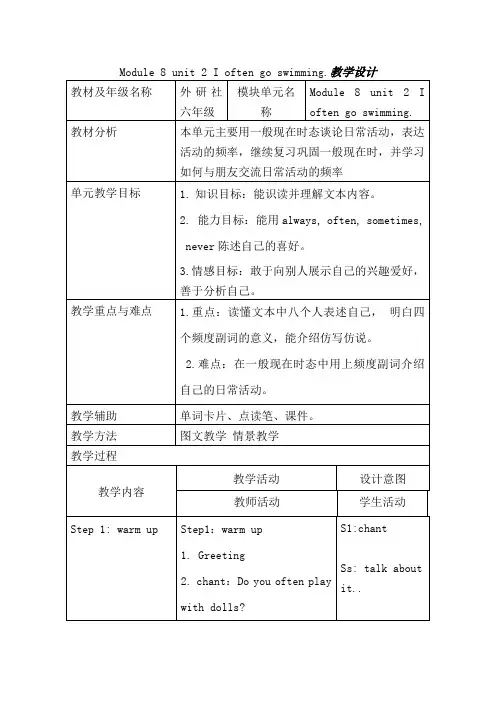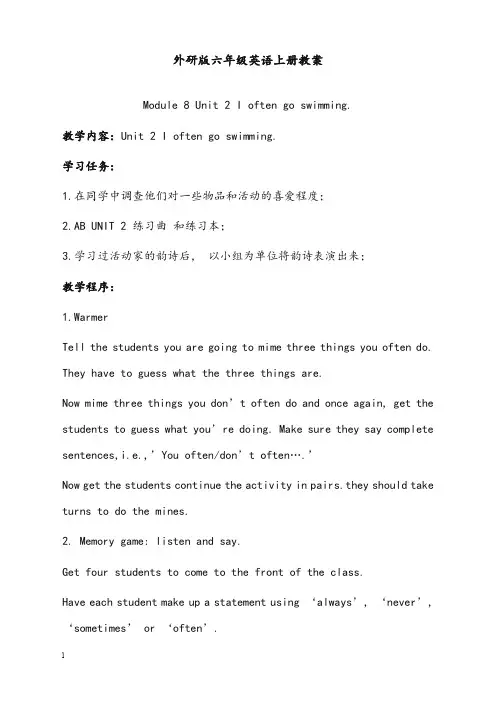六年级上册Module8Module8Unit2Ioftengoswimming教案
- 格式:docx
- 大小:17.08 KB
- 文档页数:5


外研版英语6上Module 8 Unit 2 I often go swimming.
外研版英语6上module8unit2ioftengoswimming.
模块8Unit2oftengoswiming。
教学计划
【教学目标】:
知识和技能:总是,有时,经常,从不
过程与方法:自主式,互助式,启发式,任务型教学
情绪、态度和价值观:通过使用频率副词[key]:一般现在时和现在进行时来谈论行为、习惯和偏好
【难点】:程度副词的用法:always,often,sometimesandnever.
[教学过程]:
(一)导入:
我复习
1.播放录音温习sb第一单元活动1的内容,出示挂图,让学生两人一组分角色表演课文。
2.经常练习使用。
二.任务呈现与课文导入:
1、引导学生阅读第1单元活动3中的句子。
把活动中的四个句子写在黑板上。
让学生听录音并跟读。
2.告诉学生:在今天的课文中,大家将了解到另外一些孩子的爱好和行为习惯。
我们学习了用often表示“常常做某事”,那么,“总是做某事”和“从不做某事”应当怎样表达呢?
(二)探索新知识:
1.出示sb第二单元活动1的图片,向学生介绍其中的人物,然后引导学生尽可能多的说出图片中的人物在做什么?如;thisisxiaoyu.。


六年级上册英语教案Module 8 Unit 2 I often go swimming 外研社
六年制六年级第七册第八模块第二单元
年月日
学科英语课题Module8 Unit2 I often go swimming. 课型New 备课教师使用人
教学目标1.能够听、说、读、写单词:always sometimes never
2.通过对课文的学习,能够准确使用always sometimes
3.能够用英语比较流利的说一说自己的习惯。
重点难点
重点:听、说、读、写单词:always never sometimes
难点:能够比较熟练的运用always sometimes often never 等
教学程序、师生活动和关注要点
一、
二、Greetings
师生之间进行简短的问候
三、 Free talk
自由对话,使得课堂气氛更加融洽。
四、复习巩固
复习上节课所学到的三种时态的句型,并举例子来练习。
五、呈现本课第一部分
1.请同学们看第一部分的图片,用一般现在时态表述出他们在做的事情。
例如:Heping writes English.
Maomao plays football.
Lili cleans the blackboard.
2.教师讲解:always sometimes often never 的使用
3.听录音
通过完整的听录音,记清楚每个人做的事情。
4.听句子,猜人物
A reads
B resding
C read。

六年级上册英语-Module 8 Unit 2 I often go swimming.外研版(三起)学习目标通过本单元的学习,学生应该能够:1.掌握动词频率副词的用法;2.学会描述自己喜欢和不喜欢做的事情;3.了解泳池和游泳的相关词汇;4.能够用英语简单介绍自己的爱好以及经常做的事情。
词汇1.often 经常,频繁地2.never 从未,绝不3.sometimes 有时,偶尔ually 通常地,一般地5.every day 每天6.every week 每周7.every month 每月8.every year 每年9.swimming 游泳10.pool 泳池11.like 喜欢12.don’t like 不喜欢语法动词频率副词动词频率副词用来表示动作的频率,常见的有:1.always 总是ually 通常3.often 经常4.sometimes 偶尔5.hardly ever 几乎从不6.never 从不例如:•I always go to school by bus.•He usually eats breakfast at home.•She often plays games with her friends.•They sometimes watch movies on weekends.•We hardly ever go to the park.•You never listen to me.描述喜欢和不喜欢的事情在描述喜欢和不喜欢做的事情时,可以使用以下句型:1.I like…2.I don’t like…3.Do you like…?4.Yes, I do. / No, I don’t.例如:•I like playing basketball.•I don’t like eating vegetables.•Do you like reading books?•Yes, I do. / No, I don’t.学习内容对话A: What do you often do on weekends?B: I often go swimming. How about you?A: I usually play computer games.B: Do you like swimming?A: No, I don’t like swimming.B: Why not?A: Bec ause I can’t swim.B: That’s too bad. Swimming is a good sport.新单词1.swimming pool 泳池2.goggles 眼镜3.swimsuit 游泳衣4.towel 毛巾5.locker 换衣柜短文My name is Tom. I like sports. I often go swimming after school. I go to the swimming pool every day. I have a swimsuit and goggles. I also bring a towel with me. Sometimes, I go swimming with my friends. We always have a lot of fun. How about you? Do you like swimming?练习选择合适的单词填空1.I __ go to the park on Saturdays. A. never B. sometimes C. usually2.The __ is very big and beautiful. A. locker B. swimsuit C. swimming pool3.I __ playing the piano. A. like B. don’t like C. sometimes完成句子1.Jim often __ after school.(游泳)2.Sarah __ swimming.(不喜欢)3.__ do you go swimming?(你多久游一次泳?)4.Bob and I __ play basketball every weekend.(经常)总结本单元主要学习了动词频率副词的用法、描述喜欢和不喜欢做的事情、泳池和游泳的相关词汇以及描述自己爱好和经常做的事情的短文。


六年级上册英语教案Module 8 Unit 2 I often go swimming教学内容本课为外研社(三起)六年级上册英语第8模块第2单元,主题为“我经常去游泳”。
教学内容包括一般现在时态的运用,以及描述个人日常活动。
学生将通过学习,能够使用"I often"句型来表达自己的日常习惯和活动。
教学目标1. 知识与技能:学生能够理解并运用一般现在时来描述日常活动。
2. 过程与方法:通过听、说、读、写的练习,学生能够掌握目标语言。
3. 情感态度价值观:培养学生健康的生活方式,鼓励学生分享个人兴趣。
教学难点1. 正确使用一般现在时态。
2. 词汇的记忆和应用,特别是动词短语。
3. 口语表达流畅,能够自如地描述个人日常活动。
教具学具准备1. 多媒体教学设备。
2. 词汇卡片。
3. 教学挂图。
4. 学生练习册。
教学过程1. 导入(5分钟)利用图片或视频展示不同的日常活动,引导学生用英语进行简单描述。
2. 新课呈现(15分钟)展示新课内容,通过图片和句型板书,教授新词汇和句型。
引导学生跟读,注意语音语调的正确。
3. 小组活动(10分钟)学生分小组,用目标语言描述各自的日常活动。
教师巡回指导,纠正发音和语法错误。
4. 课堂练习(10分钟)完成练习册上的相关练习,巩固新学知识。
5. 角色扮演(10分钟)学生分角色扮演,模拟对话,练习使用目标语言。
布置作业,要求学生用今天学到的句型写一段关于自己日常活动的短文。
板书设计Module 8 Unit 2 I often go swimming重点词汇:swimming, dancing, reading, playing句型:I often作业设计1. 完成练习册上的相关练习。
2. 写一篇关于自己日常活动的短文,至少包含5个句子。
课后反思本节课结束后,教师应反思教学效果,特别是学生对一般现在时态的掌握情况,以及他们能否自如地运用新学词汇描述日常活动。


外研版六年级英语上册教案Module 8 Unit 2 I often go swimming.教学内容:Unit 2 I often go swimming.学习任务:1.在同学中调查他们对一些物品和活动的喜爱程度;2.AB UNIT 2 练习曲和练习本;3.学习过活动家的韵诗后,以小组为单位将韵诗表演出来;教学程序:1.WarmerTell the students you are going to mime three things you often do. They have to guess what the three things are.Now mime three things you don’t often do and once again, get the students to guess what you’re doing. Make sure they say complete sentences,i.e.,’You often/don’t often….’Now get the students continue the activity in pairs.they should take turns to do the mines.2. Memory game: listen and say.Get four students to come to the front of the class.Have each student make up a statement using ‘always’, ‘never’, ‘sometimes’ or ‘often’.Make sentences with ‘he, she , his, her’.Examples: T (points to or indicates daming)Ss: he always cleans his room.TLpoints to or indicates lingling)Ss: she never plays with dolls.3.Listen and say, then chant.Get the students to look at the pictures and describe them(a child laughing, singing, clapping, reading a book). Ask the students if they like doing these activities.Play the tape and let the students listen to the chant, play it again and have the students say the chant at the same time.Go through the chant and cemonstrate the mime for each of the actions mentioned in the chant. The students should do the appropriate mime as they read the activities in the chant.4. after saying the chantHave the students substitute other actions instead of the ones mentioned in the chant. Explain that as ‘tree’ and ‘tv’ rhyme. They should not change those two activities.Point out that they shoud choose activities with the same number of syllables as the originals.5.homework: read the chant6. blackboard design:Unit 2 I often go swimming.Always never sometimes or oftenhe always cleans his room.she never plays with dolls.教学札记:*************************************★祝学习顺利★。

Module 8《 Unit 2 I often go swimming》教案教学目标:1、知识与技能目标:理解并能运用副词always,often,sometimes,never 谈论自己或他人的行为习惯和喜好;培养学生的交流能力和综合运用语言的能力。
2、过程与方法:通过创设语境理解四个副词的意义;通过Listen and say ,Listen and choose,Listen and repeat,Memory game,Listen and answer 操练和运用四个副词;通过结合实际用四个副词练习说话进一步巩固四个副词的用法。
3、情感态度与价值观:学生有兴趣听英语、说英语;乐于模仿,敢于开口,积极参与,主动请教;养成良好的行为习惯和健康的喜好。
重难点:四个副词的区别;当主语是第三人称单数时动词的变化。
教具准备:课文相关内容的图片;题单;课件。
教学流程:Step1.Greetings.Step2.WarmerI’ve got some cards.Please choose a card and ask with often.Read English books eat with chopsticks goswimming goshopping学生任意抽一张短语卡片,用上节课所学的语言点Do you often…?提问,其余生用Yes,I do. Yes, of course.Not very often.Not really. No,Idon’t.回答。
Step3.师创设语境,让生感知副词always ,often,sometimes,never 的意义和用法。
I read English books on Monday,Tuesday,Wednesday,Thursdayand Friday.I often read English books.师板书often 一词。
I eat with chopsticks onMonday,Tuesday,Wednesday,Thursday,Friday,Sturday and Sunday.I always eat with chopsticks.师板书always 一词。

教案:Module 8 Unit 2 I often go swimming一、教学目标1. 知识目标(1)能够听懂、会说、会读本节课的生词和重点句子。
(2)能够运用所学知识描述日常生活中常见的活动。
2. 能力目标(1)能够正确使用一般现在时描述自己的日常生活。
(2)能够通过图片和情境,正确运用一般现在时进行交际。
3. 情感目标培养学生的团队协作精神,激发学生对英语学习的兴趣。
二、教学内容3. 语法:一般现在时。
三、教学重点与难点1. 教学重点:单词的准确拼写和运用,以及一般现在时的正确使用。
2. 教学难点:一般现在时的运用,以及根据情境进行交际。
四、教具与学具准备1. 教具:PPT、单词卡片、图片。
2. 学具:课本、练习册、笔。
五、教学过程1. 热身(5分钟)(1)跟唱歌曲 "What's your favorite sport?"。
(2)老师提问,学生回答自己喜欢的运动。
2. 引入(10分钟)(1)老师展示一幅图片,问学生:“These children are doing what?”。
(2)引导学生回答:“They are going swimming.”。
(3)老师板书单词 "go swimming",并讲解。
3. 呈现(10分钟)(1)老师展示PPT,呈现本节课的生词和句子。
(2)老师逐个讲解生词和句子,让学生跟读。
4. 练习(10分钟)(1)老师发放单词卡片,让学生进行认读练习。
(2)老师组织学生进行小组活动,用一般现在时描述自己的日常生活。
5. 巩固(10分钟)(1)老师播放录音,学生跟读。
(2)老师组织学生进行角色扮演,运用一般现在时进行交际。
6. 作业布置(5分钟)(1)抄写生词。
(2)用一般现在时写一段话,描述自己的日常生活。
六、板书设计七、作业设计1. 抄写生词。
2. 用一般现在时写一段话,描述自己的日常生活。
八、课后反思本节课通过图片、录音和角色扮演等多种教学手段,让学生充分掌握了单词和句型。
Module 8 Unit 2I often go swimming教学目标.频率副词always 、sometimes、often、never 的掌握及使用。
1.学生能正确使用always、sometimes、often、never讲述行为、习惯和喜好等。
2.培养学生对英语学习的兴趣。
培养学生大胆开口、积极合作、主动学习,增强沟通能力, 增进被此了解。
教学重点(1)能听说、认读活动2的句子。
(2)频率副词always、sometimes 、often > never 的掌握及使用。
教学难点学生能正确使用always、sometimes、often、never讲述行为、习惯和喜好等。
教学准备PPT、单词卡片、做户外活动的图片若干张教学流程Step 1 Warming up and review1.Greetings.(师生间进行简单的问候。
)Let's review.教师带领学生复习上节课活动三内容。
询问对方是否经常做……(某事):Do you often 你经常吗?--- Yes, of course = Yes, (I do)表示肯定,经常做某事。
--No .1 don't. = Not really.表示否定,不全是,事实上没有。
--Not very often.不经常做某事。
Step 2 Presentation and Practice一、Look and chant1.教师播放课文第一部分,“Listen and chant ”,让学生尝试跟唱。
2.教师简单说一下歌谣大意。
3.学生完成“Listen and fill in”。
二、IJsten and read1.教师依次呈现活动2的第1幅图,教授句子。
I always ride my bike to school. I never go by bus.我总是骑自行车去学校。
我从不乘公共汽车去。
2.板书Hways总是并领读。
Module 8 Unit 2 I often go swimming一、教材分析本单元是《外研版(三起)英语》六年级上册的第八模块第二单元。
本单元主要让学生学习“ I often go swimming.”这个简单的句型,学生可以通过本单元了解如何正确运用频率副词进行描述及其构成方式。
本单元主要内容包括以下几个方面:1.学生能听懂、读懂、拼读并正确运用频率副词。
2.学生能够熟练运用现在进行时表述自己的日常活动。
3.通过学习本单元,学生可以提高对英语语言的感性理解,培养学生的英语听、说、读、写能力。
4.通过本单元的学习,可以让学生从简单的英语句型入手,对英语语法有一个初步的认识和实践。
二、教学目标知识目标1.能够熟练运用频率副词always、often、sometimes、never描述日常活动。
2.能够掌握现在进行时的用法,并正确运用。
3.能够从简单的英语句型入手,对英语语法有一个初步的认识和实践。
能力目标1.培养学生的英语听、说、读、写能力。
2.培养学生的分析、判断、解决问题的能力。
情感目标1.培养学生学习英语的兴趣和习惯;2.注重培养学生的自学能力和学习兴趣。
三、教学重点和难点教学重点:1.频率副词always、often、sometimes、never 的正确运用;2.现在进行时的用法及运用。
教学难点:1.对频率副词always、often、sometimes、never 的理解和运用;2.对现在进行时的理解和识别。
四、教学过程设计教学步骤:1.Warming-up:播放音乐,带领学生跟着音乐做运动。
然后,通过询问学生在做哪些运动,引出频率副词always、often、sometimes、never,并介绍它们的意思和构成方式。
2.Presentation:通过呈现图片的方式,引出现在进行时,并通过范例教授它的构成方式。
3.Practice:分组进行简单的口语交流练习,让学生在现实场景中及时运用所学的现在进行时。
六年级上册英语教案Module 8 Unit 2 I often go swimming∣外研版(三起)教学内容本节课为外研版六年级上册英语Module 8 Unit 2,主题为"Ioften go swimming",主要围绕日常活动及频率副词进行教学。
教学内容包括词汇如"swimming"、"cycling"、"running"等,以及句型"I often/usually/sometimes/often/never",用于描述日常活动的频率。
教学目标1. 知识与技能: 学生能够听懂、会说、会读本节课的关键词汇,并能够运用句型描述自己的日常活动及其频率。
2. 过程与方法: 通过小组讨论、角色扮演等互动活动,提高学生的英语听说能力,培养合作学习的能力。
3. 情感态度价值观: 培养学生对英语学习的兴趣,鼓励学生积极参与课堂活动,增强其自信心。
教学难点1. 词汇记忆: 对于新词汇的记忆和应用是教学的一个难点。
2. 句型运用: 学生需要理解并能够正确运用频率副词来描述日常活动。
教具学具准备1. 多媒体设备: 用于播放课件和视频。
2. 词汇卡片: 带有图片和英文单词的卡片,用于词汇教学。
3. 活动道具: 如小黑板、计时器等,用于课堂活动。
教学过程1. 导入: 利用图片或视频展示不同的日常活动,引导学生猜测并讨论。
2. 新授: 通过词汇卡片教授新词汇,并通过示例句型介绍频率副词的用法。
3. 实践: 学生进行小组活动,运用所学词汇和句型描述自己的日常活动。
4. 巩固: 通过角色扮演或小测验等形式巩固所学内容。
板书设计: Module 8 Unit 2 I often go swimming关键词汇: swimming, cycling, running,关键句型: I often/usually/ + 动词原形作业设计1. 书面作业: 完成练习册中与本课相关的练习题。
六年级上册英语教案-Module 8 Unit 2 I often go swimming 外研社(三起)教材背景本节课所涉及的教材为六年级上册英语教材,所属Module 8 Unit 2,是外研社(三起)出版的教材。
在此教材中,注重培养学生的听、说、读、写能力,围绕学生的日常生活展开教学,让学生在身边的世界中感知、享受英语,激发学生英语学习的兴趣和热情。
课程目标1.学习如何表达某些活动的频率2.学习如何描述自己和家人的一些活动3.运用学过的表达方式来进行对话,提高口语交际能力4.培养对日常生活的积极态度教学内容分析本单元围绕I often go swimming这个话题展开,提高学生的听、说、读、写等综合能力。
具体内容包括以下几个方面。
语音知识本单元中重点掌握“often”这个词的发音。
在单词最后一个音节中,字母“t”不发音,重音在词首,发音为/ˈɒfən/。
在单词中间,字母“t”发音。
重音在词首,发音为/ˈɒftən/。
重点词汇•often:常常•usually:通常•sometimes:有时候•always:总是•rarely:很少重点句型1.I often go swimming. 我经常去游泳。
2.She rarely does homework at home. 她很少在家做作业。
3.They usually play computer games in the afternoon. 他们通常在下午玩电脑游戏。
4.We always have dinner together. 我们总是一起吃晚饭。
5.He sometimes goes to the library. 他有时候去图书馆。
交际用语1.How often do you…? 你多久做一次……?2.I often/always/sometimes/usually/rarely…。
我经常/总是/有时候/通常/很少……。
3.What about you? 你呢?4.Do you like…? 你喜欢……吗?词汇拓展此单元教学重点在于学习一些与活动频率相关的词汇,以及围绕这些词汇展开的一些学习、生活场景。
六年级上册英语-Module 8 Unit 2 I often go swimming.外研版(三起)单元介绍本单元以自然景观公园为背景,包含了时间状语的用法,及常见的运动及活动词汇的学习,并采用多种形式培养学生对话语言及应用语言的能力。
语法学习时间状语的用法本单元通过时间状语的学习,让学生通过学习常用的时间状语,掌握各种时间状语的搭配方式,为学生创造更多的语言表达方式。
时间状语的种类有:now, every day, usually, sometimes, often, always, on weekends, at the weekend, in the evening, etc.使用时间状语时,需要注意动词时态的变化和相关的语序等常规用法。
例如:I go swimming at the weekend.运动及活动词汇的学习本单元中包含了一些运动及活动的词汇,如play basketball, do yoga,ride a bike, swim, play the guitar等。
通过学习这些词汇,让学生认识不同的运动和活动及相关的英文表达方式,增强学生的语言运用能力。
同时,在进行学习时需要注意这些词汇的动词词形变化和前置介词的使用等问题。
例如:I often play basketball with my friends.对话练习本单元中有多种对话练习,如学生之间的问答练习及学生和老师的互动练习等。
通过这些练习,学生可以依据自己的学习进度及语言水平,逐渐熟悉各种日常用语和相关情境的语言表达方式,提升学生的实践能力。
例如:Lily: What do you usually do in your free time?Tom: I often play the guitar.Lily: That’s cool. Do you like playing the guitar?Tom: Yes, I do.Lily: Can you play some songs for us?Tom: Sure.总结本单元中涉及了语法、词汇及对话等方面的学习。
Module 8 Unit 2
I often go swimming
教学目标
1. 频率副词always 、sometimes 、often 、never的掌握及使用。
2. 学生能正确使用always 、sometimes 、often 、never 讲述行为、习惯和喜好等。
3. 培养学生对英语学习的兴趣。
培养学生大胆开口、积极合作、主动学习,增强沟通能力,增进彼此了解。
教学重点
(1)能听说、认读活动2 的句子。
(2)频率副词always 、sometimes 、often 、never的掌握及使用。
教学难点
学生能正确使用always 、sometimes 、often 、never 讲述行为、习惯和喜好等。
教学准备
PPT、单词卡片、做户外活动的图片若干张
教学流程
Step 1 Warming up and review
1. Greetings.(师生间进行简单的问候。
)
2. Let’s review.
教师带领学生复习上节课活动三内容。
询问对方是否经常做……(某事):
Do you often ….? 你经常……吗?
---- Yes, of course = Yes,(I do)
表示肯定,经常做某事。
---- No .I don’t . = Not really.
表示否定,不全是,事实上没有。
----Not very often. 不经常做某事。
Step 2 Presentation and Practice
一、Look and chant
1.教师播放课文第一部分,“Listen and chant ”,让学生尝试跟唱。
2. 教师简单说一下歌谣大意。
3. 学生完成“Listen and fill in”。
二、Listen and read
1. 教师依次呈现活动2的第1幅图,教授句子。
I always ride my bike to school. Inever go by bus.
我总是骑自行车去学校。
我从不乘公共汽车去。
2. 板书always 总是并领读。
3. 教师依次呈现活动2的第2、3、4幅图,教授句子。
I often eat with a knife and fork. But I like chopsticks.
我经常用一副刀叉吃饭。
但是我喜欢筷子。
I often go swimming. I like swimming in the sea.
我经常去游泳。
我喜欢在大海里游泳。
I love English. I often read English books.。
我喜欢英语。
我经常读英语书。
4. 教师呈现活动2的第5、6幅图,教授句子。
I like writing stories. Sometimes, I write stories in English.
我喜欢写故事。
有时,我用英语写故事。
I sometimes clean the blackboard for my teacher.
我有时为我的老师擦黑板。
5. 板书sometimes有时候并领读。
6. 教师呈现活动2的第7、8幅图,教授句子。
I never play football. I don't like it.
我从不踢足球。
我不喜欢踢足球。
I never play with dolls. I don't like them.
我从不玩玩具娃娃。
我不喜欢它们。
7.板书never从不并领读。
8.重点讲解:
a)频率副词:
always 总是often 经常sometimes 有时候never 从不
b)一般现在时:描述经常发生的动作或事情。
句中经常会出现的词:always 、often 、sometimes 、never .
c)句子中,当主语是:I 、You、they和复数时,谓语动词用原形。
当主语是(he 、she 、it 、人名和单数),谓语动词后面要加“+s , +es”或特变
形式。
Eg:Amy and Daming sometimes ____(go 、goes) to the park .
Amy often ____(go 、goes) to the park .
9.呈现Page47活动2 课文,学生自己尝试独立阅读。
10.再次播放录音,学生跟读。
请学生认真仔细读句子,同时尽可能记住每个人物的行为
习惯和喜好
11.操练:6. 操练:Read,ask and answer .学生根据A2句子填出对应的频率副词。
1. HePing___________writes stories in English.
2. Maomao______plays football.
3. Lili___________cleans the blackboard.
4. Lingling______plays with her dolls.
5. Xiaoyu______reads English books.
6. Sam______swims.
7. Daming______eats with a knife and fork.
8. Simon________rides his bike to school , he never goes by bus.
三、Listen and complete
1. 呈现Page48活动3 课文,学生自己尝试读一读。
2. 小组合作,讨论问题答案。
3. 教师核对答案。
4. 教师领读Page36 活动3 课文。
5).操练:教师列出几个句子,要求学生用动词的正确形式填空。
a)Maomao often______ football. (play)
b) They sometimes ___________ the blackboard. ( clean )
c). Amy never_____ with her dolls. (play)
d). Sam always______ English books. (read)
Step 3 Consolidation
挑战我自己。
学生分别用四个频率副词造句。
Make four sentences using “always 、sometimes 、often 、never”Step 4 Summary
总结今天所学的内容。
Step 5 Homework
1.能独立完整地朗读35页活动2的对话。
2. 完成配套教辅相应的练习。